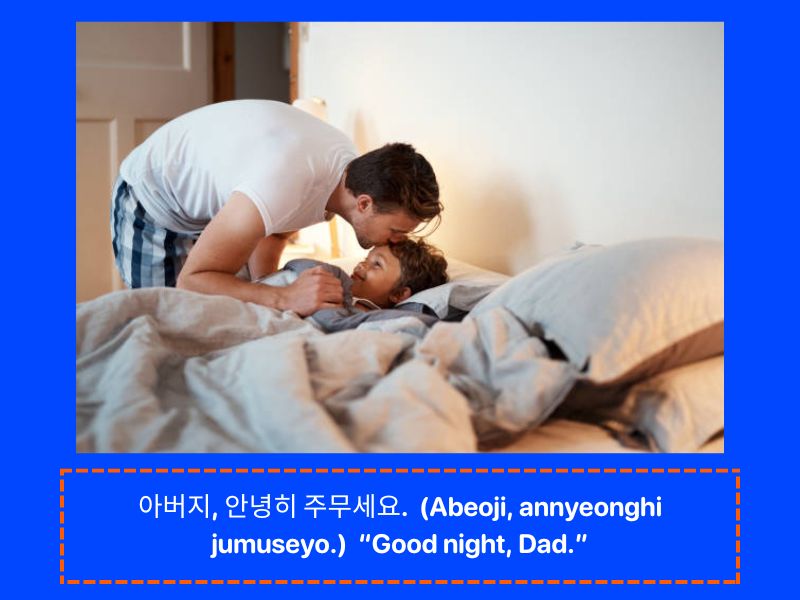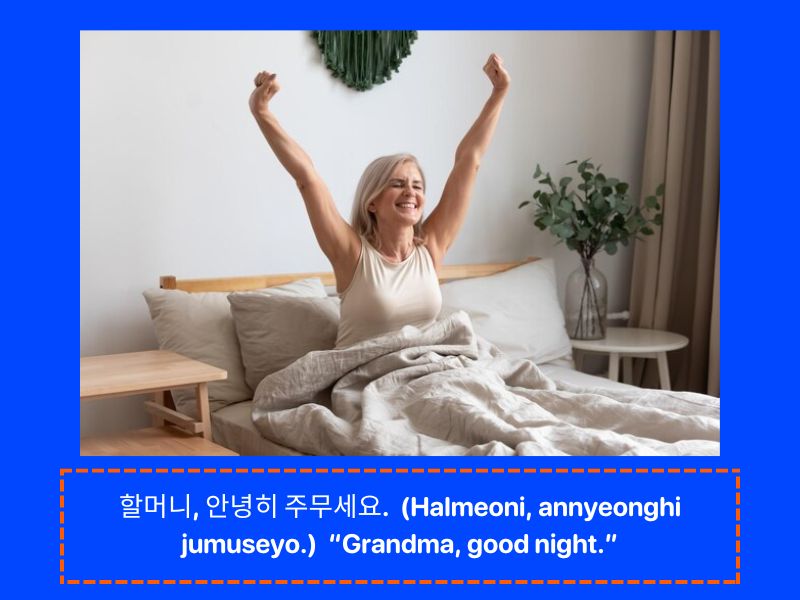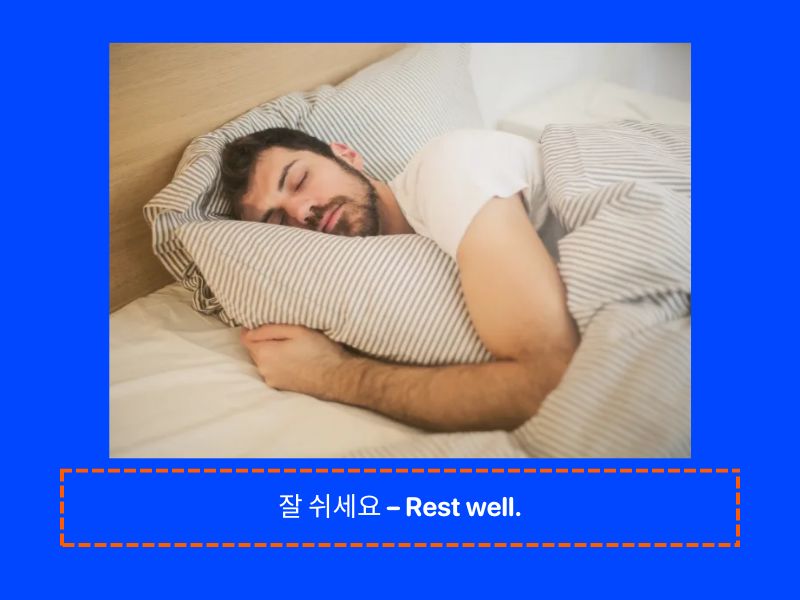In this guide, you’ll learn how to say good night in Korean language, the difference between formal and informal expressions, and when to use each phrase based on the situation.
Basic Korean Good Night Greetings
When saying Good Night in Korean, there are several expressions commonly heard in daily life, especially in K-dramas and real-life conversations. Before we dive into several ways of saying Good Night in Korean, just make sure to build a well-rounded Korean greeting vocabulary by checking out our full guide on How to say Hello in Korean, and don’t miss these common Korean words and phrases that are perfect for everyday conversations.
잘 자요 (Jal ja-yo) – The Most Common Way to Say Good Night

- Meaning: Sleep well / Good night
- Pronunciation: [Jal ja-yo]
잘 자요 is the standard and polite way to say good night in Korean. It’s used with people you are close to but still need to speak to respectfully—like acquaintances, colleagues, or elders you’re somewhat familiar with.
Example:
- 오늘 하루도 수고했어요. 잘 자요! (Oneul harudo sugohaesseoyo. Jal jayo!) “You worked hard today. Good night!”
If you’re wondering how to say good night in Korean in a polite and friendly way, 잘 자요 is your go-to expression.
안녕히 주무세요 (Annyeonghi jumuseyo) – A More Formal Way to Say Good Night

- Meaning: Sleep peacefully / Good night (formal)
- Pronunciation: [An-nyeong-hi ju-mu-se-yo]
안녕히 주무세요 is a formal and honorific way to say good night in Korean language. It is typically used when talking to elders, strangers, or people in higher social positions such as teachers, bosses, or clients.
The verb 주무시다 is the honorific form of 자다 (to sleep), making this version more respectful.
Example:
- 아버지, 안녕히 주무세요. (Abeoji, annyeonghi jumuseyo.) “Good night, Dad.”
Use this phrase when you want to show politeness and respect in formal or family settings.
잘 쉬세요 (Jal swiseyo) – A Polite Way Often Used in Business

- Meaning: Rest well / Have a good rest
- Pronunciation: [Jal swi-se-yo]
While 잘 쉬세요 doesn’t directly translate to “good night,” it’s often used as a polite way to end the day in workplace or formal conversations, especially when you’re not sure if the person is going straight to bed.
It implies “Have a good rest” and works well after a long day of work or at the end of a meeting.
Example:
- 오늘 고생 많으셨습니다. 잘 쉬세요! (Oneul gosaeng maneusyeotseumnida. Jal swiseyo!) “You worked hard today. Please rest well!”
These are some of the more versatile ways to say good night in Korean, and it can even be used in professional settings depending on the tone and context. If you’re looking to expand your Korean greetings even further, don’t miss our guide on How to say Good Morning in Korean—perfect for starting your day with the right words!
Good Night Phrases for Different Situations
Now that you know the basic phrases, let’s break down how to say good night in Korean depending on the relationship and setting. Korean is a language that values hierarchy and respect, so the correct usage matters a lot.
Saying Good Night in Korean to Friends

When you’re talking to close friends, especially those the same age or younger, you can drop formalities and use the informal version.
Phrase: 잘 자 (Jal ja)
- Meaning: Sleep well
- Usage: Very casual, for friends, siblings, or kids
Example:
- 잘 자! 내일 보자. (Jal ja! Naeil boja.) “Good night! See you tomorrow.”
This version is warm, simple, and shows closeness. It’s perfect for texting friends or saying good night after hanging out.
Saying Good Night in Korean to Family

In Korean households, the formality level can vary. When talking to parents or grandparents, it’s better to stick with 안녕히 주무세요, while with siblings, 잘 자 is perfectly fine.
Example (to a grandparent):
- 할머니, 안녕히 주무세요. (Halmeoni, annyeonghi jumuseyo.) “Grandma, good night.”
Example (to a younger sibling):
- 잘 자~ 좋은 꿈 꿔! (Jal ja~ joeun kkum kkwo!) “Good night~ Sweet dreams!”
This shows that even within families, good night in Korean language can shift based on age and respect.
Saying Good Night in Korean to Colleagues

In the workplace, professionalism is key. If you’re leaving late from work or ending a late call or meeting, you can use:
- 잘 쉬세요 – Rest well.
- 안녕히 주무세요 – Good night (formal) if it’s late evening.
- 수고하셨습니다 – You’ve worked hard (a polite send-off).
Example:
- 오늘도 수고 많으셨습니다. 잘 쉬세요. (Oneuldo sugo maneusyeotseumnida. Jal swiseyo.) “Thanks for your hard work today. Please rest well.”
This is a great way to end the day politely while maintaining professionalism.
Saying Good Night in a Formal Setting

If you’re in a formal environment such as staying with a Korean host family, meeting someone for the first time, or speaking with an elder, you’ll want to use the most respectful version.
Phrase: 안녕히 주무세요
Example:
- 오늘 즐거운 시간 보내셨어요? 안녕히 주무세요! (Oneul jeulgeoun sigan bonaesyeosseoyo? Annyeonghi jumuseyo!) “Did you have a good time today? Sleep well!”
Learning how to say good night in Korean is a simple yet powerful way to show care and respect. From the formal 안녕히 주무세요 to the casual 잘 자, each version serves a purpose depending on the situation.
Conclusion
Whether you’re watching K-dramas, texting a Korean friend, or preparing for a trip to Korea, understanding the cultural nuances and language levels is key. Now that you know good night in Korean language, you can say it confidently and appropriately—no matter who you’re talking to. Stay tuned to GuruLango for further language learning tips and guides!